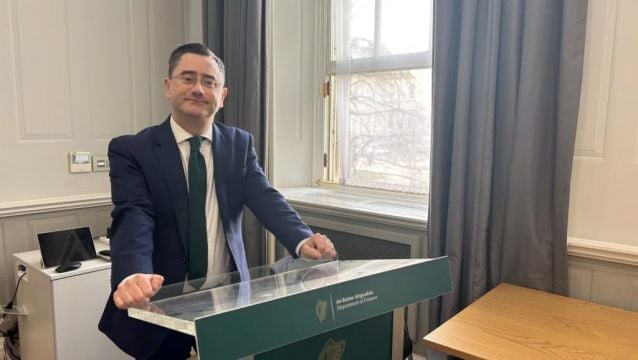Corporation tax receipts amounted to €3.2 billion in the first quarter of 2023, up €1.3 billion ahead of the same period last year.
The Department of Finance’s chief economist John McCarthy said this came with a degree of uncertainty and the 71% increase could reflect a “timing issue” on the earlier payment of receipts.
“Exports and profitability in the multinational sector continues to be strong in Q1,” he said.
The latest Exchequer figures show that tax revenues in the first quarter amounted to 19.7 billion euro, almost 15% higher than last year.
Income tax receipts “remain solid”, up 8% to €7.4 billion.
“Income tax up by about half a billion, suggesting that the labour market was very resilient in Q1,” Mr McCarthy said.
VAT receipts totalled €6.8 billion in the quarter, up 16% on an annual basis.
Mr McCarthy noted that January receipts, included in Q1, includes activity in November and December such as Christmas sales.
Total gross voted expenditure to the end of March amounted to €19.8 billion, €0.9 billion or 4.9% above the same period in 2022 and €600 million or 2.8% below profile.
An Exchequer deficit of €2.1 billion was recorded in the first quarter of 2023.
This compares to a surplus of €200 million in the same period last year – the deterioration in the headline balance is due the transfer of four billion to the National Reserve Fund in February.
Mr McCarthy said the Department had a preferred metric of 12-month rolling basis to “smooth out some of the volatility”.
“Once you exclude the impact of what we see as excess corporate tax receipts, the impact of the State’s disposal of its equity in the two banks over the course of the last 12 months and the transfer to the reserve funds, there was an underlying Exchequer deficit of about three and a half billion at the end of March,” he said.
Mr McCarthy warned about the concentration of corporation tax from a small number of firms.
“If you look at some of the potential shocks to the economy that would have a hit on corporate tax, as to when they might happen we simply we simply don’t know.
“That’s why we’ve gone down the road of trying to identify the what is temporary and what is permanent, because it will be a grave policy. error to repeat what we done 15 years ago, ramp up permanent spending on the basis of receipts that are potentially transitory in nature,” Mr McCarthy said.
Minister for Finance Michael McGrath said the figures confirm “strong momentum” in the economy.
“It is, of course, essential that windfall corporation tax receipts are not used to fund permanent expenditure,” he said.
“This is why I transferred four billion euro to the National Reserve Fund in February – there is now six billion euro in the Fund.
“I will also seek government approval in the coming weeks for a longer-term fund to meet the costs of an ageing population and other pressures that we know will arise in the future.”
The Minister for Public Expenditure, NDP Delivery and Reform, Paschal Donohoe said a 34 per cent increase on capital investment shows “significant progress” in the rollout of the National Development Plan.
The Government will publish the Stability Programme Update on April 18, as the first stage in the Budgetary process.







